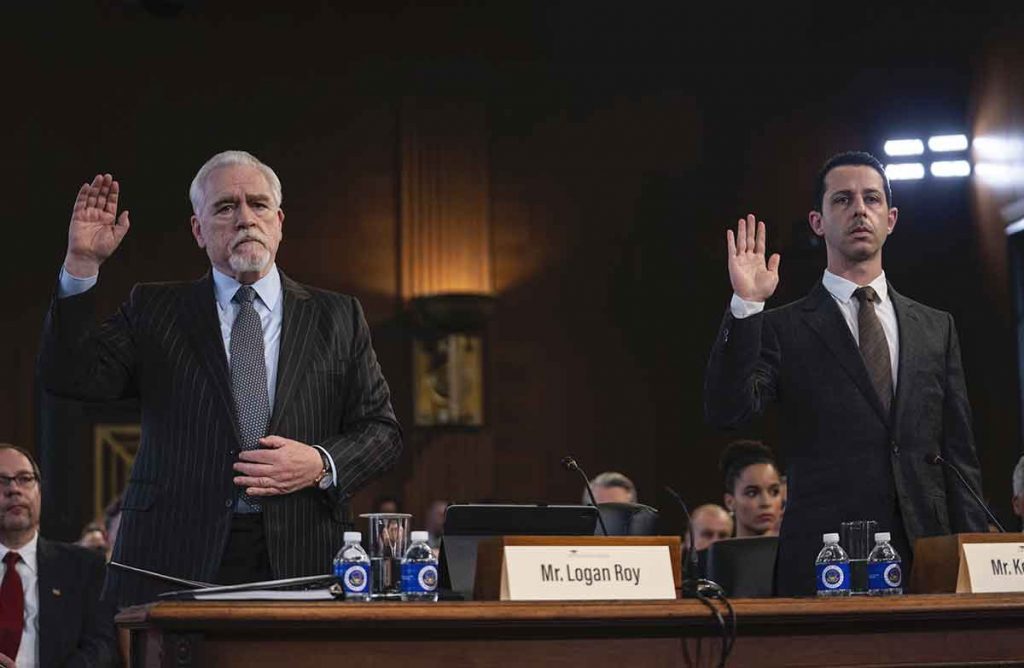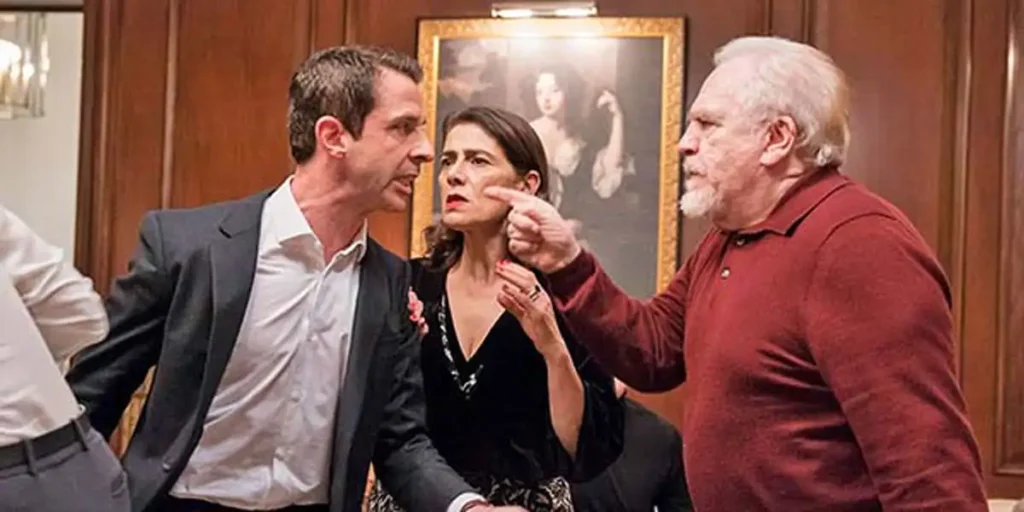HBO’s Succession encompasses the intricacy of power and family business, and it unveils the aftermath of this mix in a brilliant Shakespearian-carnivalesque farce.
The dynamics of white American tycoons’ power are among the dullest concerns that contemporary television could ever set out to represent. Who would take into heart the matter of the inheritance of an 80-year-old media mogul when people out there are protesting the wealth gap day and night? How could you care about million-dollar company merges and acquisitions when the small businesses you know are being shut down every fortnight? That’s exactly what’s at the core of HBO’s Succession– the five figures deals, the billionaires’ ruthlessness and ennui, the yacht meetings. And yet, the show somehow twists our interests, making all that bluff look extremely compelling, like the best reality shows are capable of doing. Succession makes up for its lack of grasp of reality by interweaving tragic lyricism in its intrigues, punctuating Shakespearian gravity to the upmost demeaning humor. Opening up to the scenario of what would happen if the Kardashians were to read Shakespeare.
After a grandiose second season in 2019, this fall should have seen Succession make its comeback on HBO, but it has now been postponed for a year. Set out in today’s über-real Manhattan Financial District, the show follows the power dynamics of the Roy family (the fictionalized version of the Murdochs), in charge of an influent media conglomeration. As the patriarch Logan Roy (Brian Cox) suffers from a heart attack, the whole family comes together to decide who’s going to take his place at the peak of the pyramid, only to find out that each of the four heirs envisions themselves on that seat.
The show’s narrative complexity is played out by the multi-facetedness of its characters’ relationships and intrigues, which continuously overlap the realms of family and work. These two microcosms are represented as incubators of toxicity and social distress, fully encapsulated in the protagonists’ ruthlessness and ambiguous moral compass. Two major movements bring the narrative forward: the ascent of the media company and the characters’ moral descent. The trend of these forces is bound to diverge and affect the characters into the evolution of their roles. Interestingly, the three heirs are, inside the higher game of power, like pawns in the game of chess, moved around by the patriarch, who’ll forever decide their place in the chessboard.
Kendall (Jeremy Strong) is the favorite son, the chosen one. Raised with the sole purpose of taking over his father’s company, as his narrative unfolds he watches it go by without engaging in it. He’s humanly bound to crack under the pressures of his overwritten and calculated future plans, straying with the overdoing of drugs and casual sexual encounters. Kendall is the present day adaptation of Hamlet. Roman (Kieran Culkin) is the odd one out– or at least, that is the role his father cut out for him. He refers to himself as “dumb but smart”: he’s never been taken seriously, so he has never even made an attempt. However, over the course of the series he discovers himself to be ambitious and quite capable, though he’ll have to take a stand to prove it. Shiv’s story, the slow ascent of the only girl in a man-centered family, lies exemplary. Written up to undervalue herself and to mimic her brothers, Shiv (Sarah Snook) understands only later the importance of her unique stance, and will do anything to make her voice heard at male-dominated board meetings.

There’s tragic lyricism in the movements that these pawns are made to do. It’s because patriarch Logan Roy is a self-defined Shakespeare fan and won’t resist to making a blink to it (“Here’s my favorite line from Shakespeare: Take the fucking money”.) Because of this, and because of many narrative tropes, Succession has been frequently juxtaposed to Shakespeare by the characters themselves and the critics. I am most sure that if the Bard was commissioned a show on HBO, this is what would come out. It encompasses it all: the story of the intricacy of power and family (at an unsubtle King Lear level); the complexity of the characters, portrayed in their kitchen sink dramas, in the moment before making a move (as said before, Kendall Roy is literally our Hamlet); it’s punctuated by a dramatic gravity that plays around tension-and-release. Lastly, the onstage choreography of the alternating of the pawns totally gives tragic Elizabethan theater vibes.
Playing with the inherent intensity of the genre and subject matter, the tone is expertly marked by sharp black-humor. Pointing the finger at his past in comedy, director Jesse Armstrong explained, in a BAFTA conference on Zoom, that “[Succession’s] tone encompasses comedy the same way the world does: it reveals ridiculousness, purposelessness, vanity failure – it is a part of how we respond to it.” This is clear especially in the first season, where scenes are punctuated by a ridiculously heavy camera movement, overtly mocking shows like The Office’s effective grasp of reality.
With the sacred boundaries between family and work colliding, the show frequently stops at a carnivalesque dimension where there isn’t any kind of censorship. The protagonists’ brutal and uncut lines will most certainly leave you puzzled at first. For instance, the father won’t hesitate to genuinely call his son the r-word. And at the same time the family will talk about any kind of bodily fluids while at a business meeting in an underground club. But then, the familiarity of that mechanism will grow on you, divertingly hitting on the buttons that are usually ruled out. The characters even move around the screen completely uninhibited–unaware of being seen and heard.
In fact, the show is filled with such psyche-revelatory moments like the indelible scene from season 1 where Roman masturbates in his office while gloriously glancing at the NYC landscape where all the skyscrapers are to be looked at from the above. You won’t like most characters, as they are despicable and generally ill-purposed, but Armstrong’s witty take gives a key in to understand their motives– most of the times the motive someone else wrote out for them.
If you weren’t sure it was a scripted show, you could easily mistake its parodic tone for that of a reality show, like Keeping up with the Kardashians. Succession succeeds as a show in its being unapologetically real while taking the form of a niche media tragedy. The reality is framed with a different and totally privileged angle; in fact, its bold take reminds us of the best reality shows. And it makes us laugh like one of them: its witty ability to explore black humor hits just the right spot, and doesn’t come through as elitist at all. After all, all those merges and five figure acquisitions are only pretexts to strip off for a sound laugh.
Succession is now available to watch on HBO and Max.

